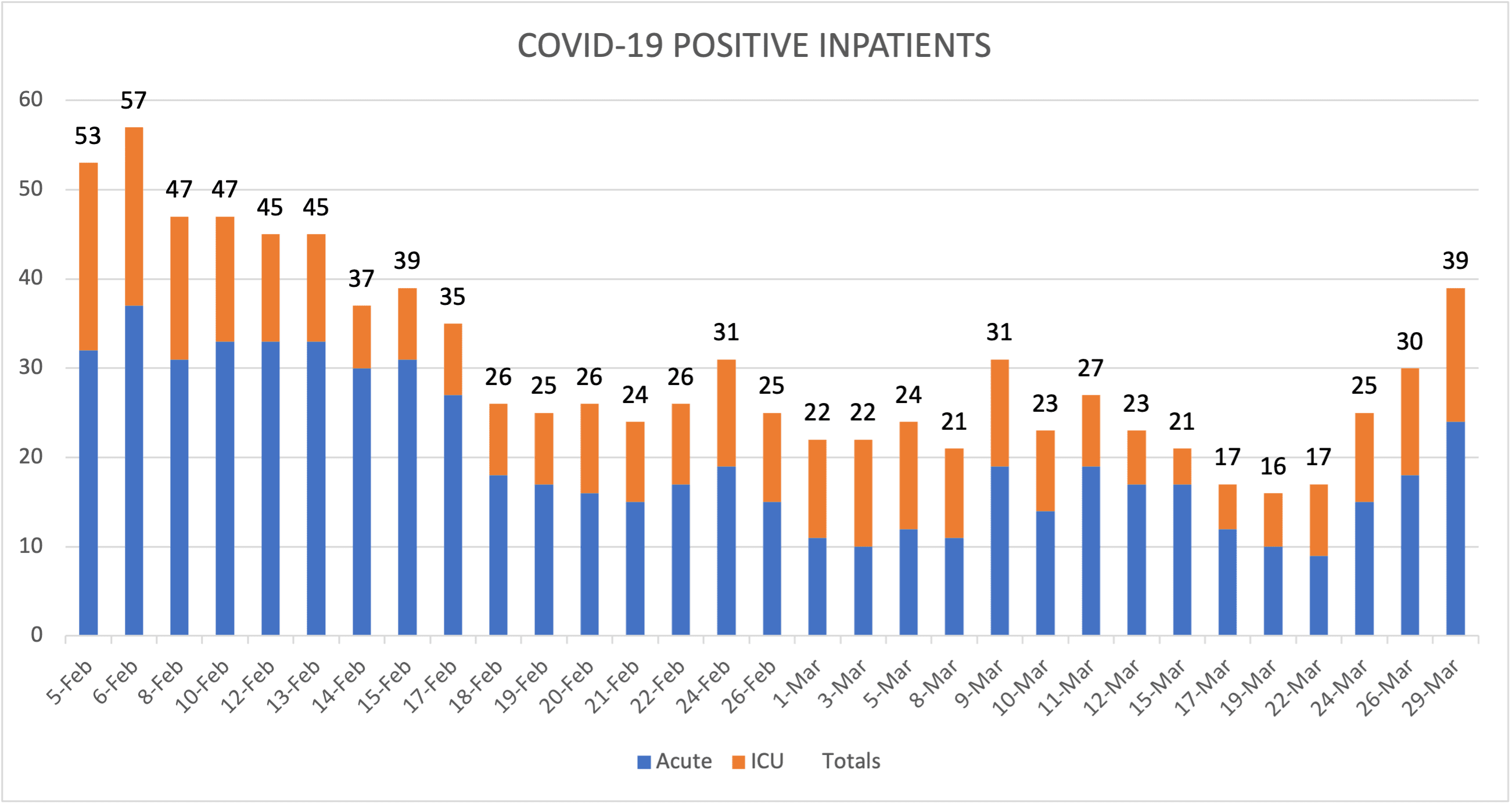Data Snapshot
UW Medicine Hospitals:

King County: The county reported 185 new positive cases and 0 new deaths on March 29.
Washington: The state reported 339,761 cases and 5,226 deaths as of March 28.
United States: The CDC reports 30,085,827 cases and 546,704 deaths as of March 29.
Global: WHO reports 127,349,248 confirmed COVID-19 cases and 2,787,593 deaths as of March. 29.
Numbers update frequently, please follow links for most up-to-date numbers.
UW Medicine COVID-19 Vaccine Distribution Update
Total Vaccine Doses Administered: 167,255
- Total first dose: 94,992
- Total second dose: 72,263
As of March 28, 2021.
UW Medicine in the News
The Seattle Times: Washington state finds more than 600 COVID-19 cases caused by closely watched variants
Featuring: Pavitra Roychoudhury, Laboratory Medicine
“Laboratories in Washington state have identified more than 600 cases of COVID-19 caused by coronavirus variants that state and federal officials are tracking closely, according to a report released last week by the Washington Department of Health. Through genomic sequencing, the state has identified 592 cases involving one of five “variants of concern,” which have characteristics that scientists believe could allow them to spread more easily, cause more harm or reduce the effectiveness of vaccination or treatment, according to the U.S. Centers for Disease Control and Prevention. The state also documented 13 cases involving one of three ‘variants of interest,’ which are under further investigation by researchers. ‘All the variants of concern have arrived in Washington state and are rising in many parts of the state,’ said Pavitra Roychoudhury, a computational biologist with UW Medicine. ‘I think this underscores the importance of doing genomic sequencing in a regular fashion. It’s preparing us for what might come through the population.’
MIT Technology Review: Keeping covid vaccines cold isn’t easy, but these ideas could help
Featuring: Deborah Fuller, Microbiology
“Some vaccines are already able to handle more typical refrigerator temperatures: Johnson & Johnson’s and AstraZeneca’s, for example. But messenger RNA (mRNA) vaccines such as those by Pfizer and Moderna, which have proved more effective and will be far easier to modify to fight new variants, have a shelf life of just a few hours once they’re out of very cold temperatures. Those temperature needs are an issue in places where access to ultra-cold freezers or even electricity is scarce, but keeping vaccines cold can be a struggle even in rich countries like the US. To get around these problems, scientists and engineers are taking two different routes: changing parts of the cold chain, or changing the vaccines themselves.”
KIRO 7: Can you transmit COVID if you’re vaccinated? Local researchers enlist college students to find out
Featuring: Amanda Casto, Allergy & Infectious Diseases
“Participants will swab their noses every day. If they test positive, their closest contacts enrolled in the trial will also swab their noses too. ‘We’ll be able to see, okay, here’s your three people you’ve been really close to in the last week when you acquired infection, and in the period soon after, did they become infected? Were you able to transmit to them or not?’ explained Brown. The study will last for five months. Researchers chose college campuses because they are relatively closed populations and have seen spikes in cases. At the University of Washington, they will have students get tested twice a week at the Husky Coronavirus Testing Program. ‘When they’re coming in in person, that’s when we’re asking them to bring in the swabs they collected at home, and we’ll send them off to be tested,’ said Dr. Amanda Casto, Allergy and Infectious Diseases, UW Medicine. ‘The daily swabs are very important, even if the Husky Testing Program is the first program to detect their infection. We can go back and test those swabs from earlier days to find out exactly when they developed the infection.’ Researchers at the University of Washington plan to email students who are currently participating in the Husky Coronavirus Testing Program next week to see if they are interested in enrolling in the trial.”
COVID-19 Literature Report
COVID-19 Literature Situation Report is a daily (M-F) newsletter put together by the Alliance for Pandemic Preparedness that provides a succinct summary of the latest scientific literature related to the COVID-19 pandemic.
Key Takeaways: COVID-19 Literature Situation Report March 25, 2021
- Only 1% of over 14,000 nursing home residents in the UK who have received the first dose of either the Pfizer-BioNTech or Oxford-AstraZeneca vaccines reported a positive SARS-CoV-2 PCR test in an observational study from December 2020 to March 2021. 90% of infections occurred within 28 days of the first dose. More.
- Weekly incidence of COVID-19 among healthcare workers in a two-campus medical center in Jerusalem steadily declined after commencement of two-dose vaccinations with the Pfizer-BioNTech vaccine in December 2020. Decline in incidence occurred despite a surge of the B.1.1.7 variant (up to 80% of cases) within the community. More.
COVID-19 Literature Surveillance Team, is an affiliated group of medical students, PhDs and physicians keeping up with the latest research on SARS-CoV-2 / COVID-19 by finding the newest articles, reading them, grading their level of evidence and bringing you the bottom line.
Read the latest report: March 29 | Daily COVID-19 LST Report.
Listen to the latest podcast: Week of Feb. 15 | COVID-19 LST Podcast.
Tweet of the Week
“That’s big because if you don’t get infected you can’t transmit the virus,” said Dr. Deborah Fuller with @UWMedicine Microbiology. @FullerLab_UW @TammyKOMO https://t.co/Iy8cCBEsvc
— UW Medicine Newsroom (@uwmnewsroom) March 30, 2021

